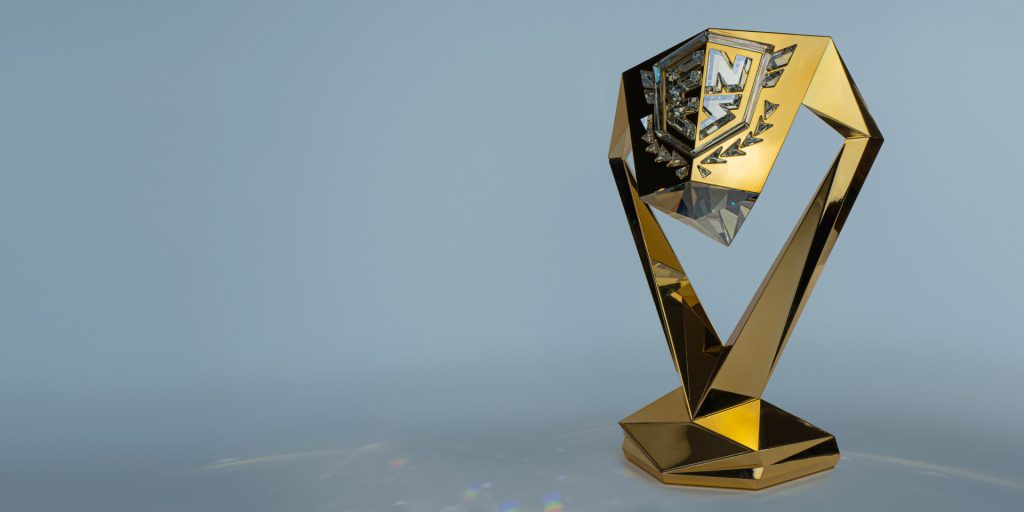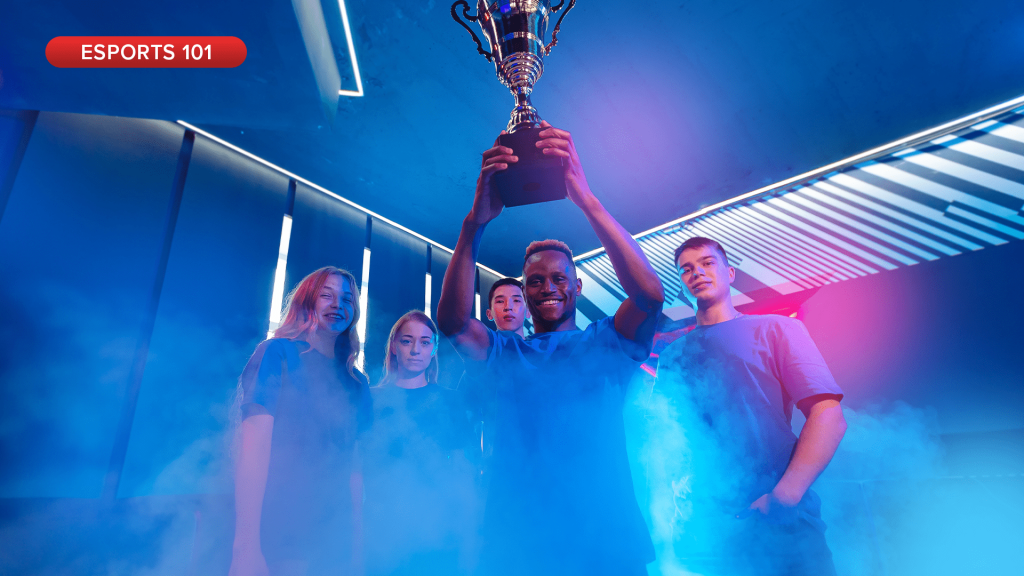
An esports tournament or a league can span days, weeks or even months, with players battling through gruelling games to be crowned champion. In the end, an event’s conclusion always builds to one single moment — the lifting of the trophy.
While it’s obvious to focus on the teams and players that do the lifting, what if, for a change, an emphasis is put on the trophies that are being lifted? Esports, being a relatively new industry with a large margin for creativity, brought some of the most interesting trophy designs to the world. So, it’s time to highlight some of the most iconic ones.
This article will feature esports trophies and rewards based on their appearance, legacy and uniqueness. The trophies are not be featured in a particular order.
IEM Katowice and IEM Cologne
Perhaps two of the most iconic trophies in the history of Counter-Strike, the Katowice and Cologne trophies, are awarded to the winners of the two oldest CS tournaments in the ESL ecosystem. According to ESL, both were created by the same company that makes the official DFB trophies.
The IEM Katowice trophy resembles the well-known UEFA Champions League trophy in football, being that it is a large silver bowl with two handles on the sides. Unlike most major esports trophies, which look to stray away from a more traditional sporting aesthetic, the prestige of the event has helped make this trophy stand out in its own right.
The Katowice trophy is special because of its legacy, with the trophy carrying all the IEM Katowice winners, but also the IEM Global Finals, dating back to 2010. The current iteration is the fourth one to be created, and was introduced in 2016.
IEM Cologne’s crowing piece, on the other hand, features a rather unique design. Similar in shape to the DFB Pokal, the trophy of the German football cup, it is a tall and narrow design. The Cologne trophy has a total of eight separate tiers on which the names of the winners are engraved. The current edition was created in 2021.
The names of the winners of each edition are engraved on both trophies, and are returned to ESL before the next edition takes place.
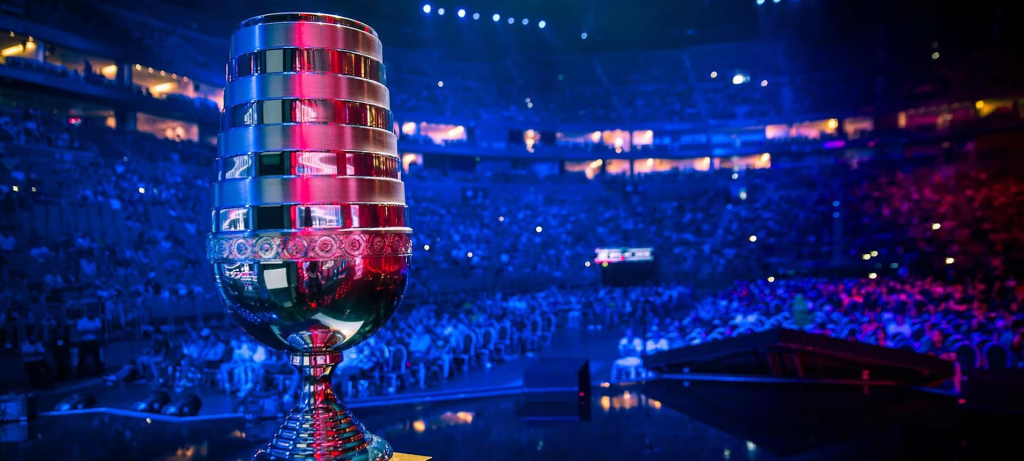
Summoner’s Cup
The trophy handed to the winners of the League of Legends World Championship, the most-watched event in esports, is called the Summoner’s Cup. It was introduced in 2012, and is currently in its second iteration, created by American jewellery brand Tiffany & Co. We picked both iterations of the trophy because not only are both incredibly significant, but the shift to a more minimal design also somehow metaphorically reflects the maturity of the esports industry as a whole.
The original Cup was created by Thomas Lyte, the company behind the FA Cup design and other notable trophies, and weighed more than 30 kilograms. This made it one of the heaviest trophies in sports in general.
The trophy underwent a redesign in 2022, simplifying its overall appearance but keeping the shape. It is still not a light trophy — the new Cup weighs just over 20 kilograms.
Similar to other major trophies in esports, there is only one Cup, and it transitions from team to team each year. Names of all the previous winners are engraved on the bottom of the trophy.
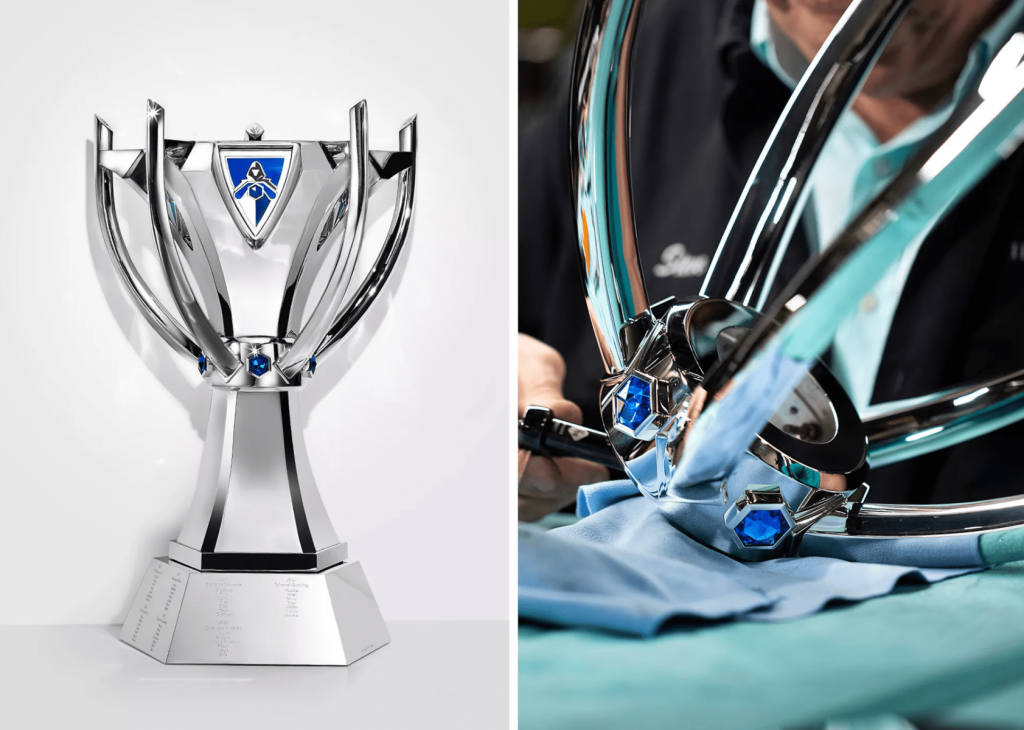
Aegis of Champions
Another trophy resembling a well-known football trophy (The Bundesliga trophy) is the Aegis of Champions, awarded to the winners of The International in Dota 2. Contrary to Riot Games, Valve did not partner with a jewellery company to create the Aegis, instead working with Weta Workshop, a special effects studio known for creating armour and props for the Lord of the Rings movies.
The Aegis was created in 2012, and is still in its first iteration. The front side resembles a shield, and Valve noted that it must be “useful in a sword fight” when creating a brief to Weta. Interestingly, the Aegis is indeed a somewhat functional shield, made out of leather, bronze and silver instead of jewels or crystals.
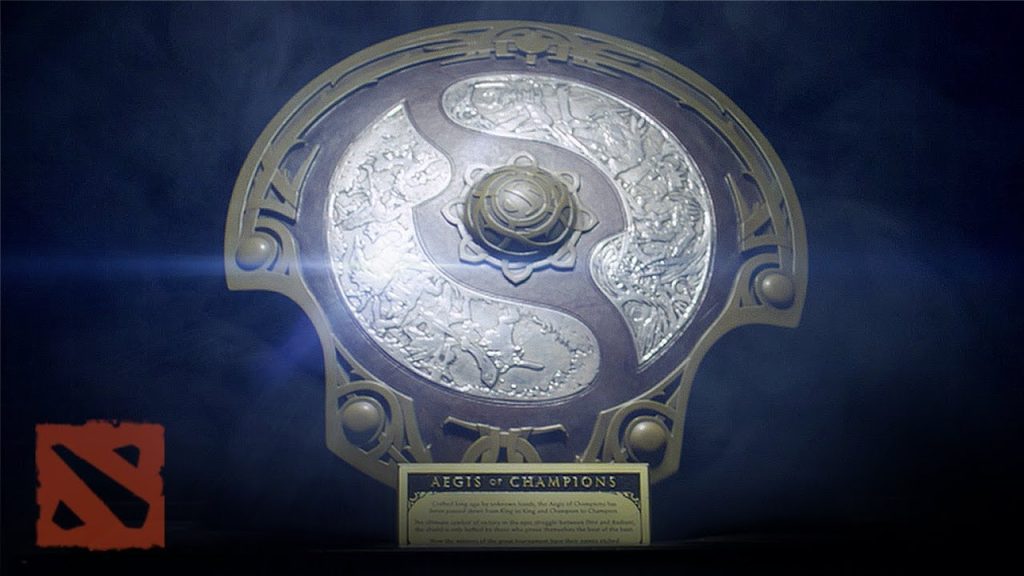
Strangest trophy award: BLAST.tv Major 2023 trophy
The last Major tournament in CS:GO was the first one played in France and the first one organised by BLAST. For that alone the trophy has historical significance, however, there are also several other reasons to mention it. For instance, while the trophy’s design was decided on by BLAST, the BLAST community made the decision on the colour, with purple winning against yellow.
The trophy was designed by BLAST and Fabit, a 3D design studio that also created the ESL Pro League trophy.
The trophy’s design, which features a BLAST logo standing on a goo-like melting substance, was also divisive, with some calling it too small, strange and overall not impressive enough to be deserving of a major milestone in CS history. The fact that it lights up was a nice touch, but overall the trophy looked somewhat cartoonish when compared to even other BLAST trophies, such as the golden edition awarded for the BLAST Premier World Finals. Still, there is certainly a niche appeal to this award.
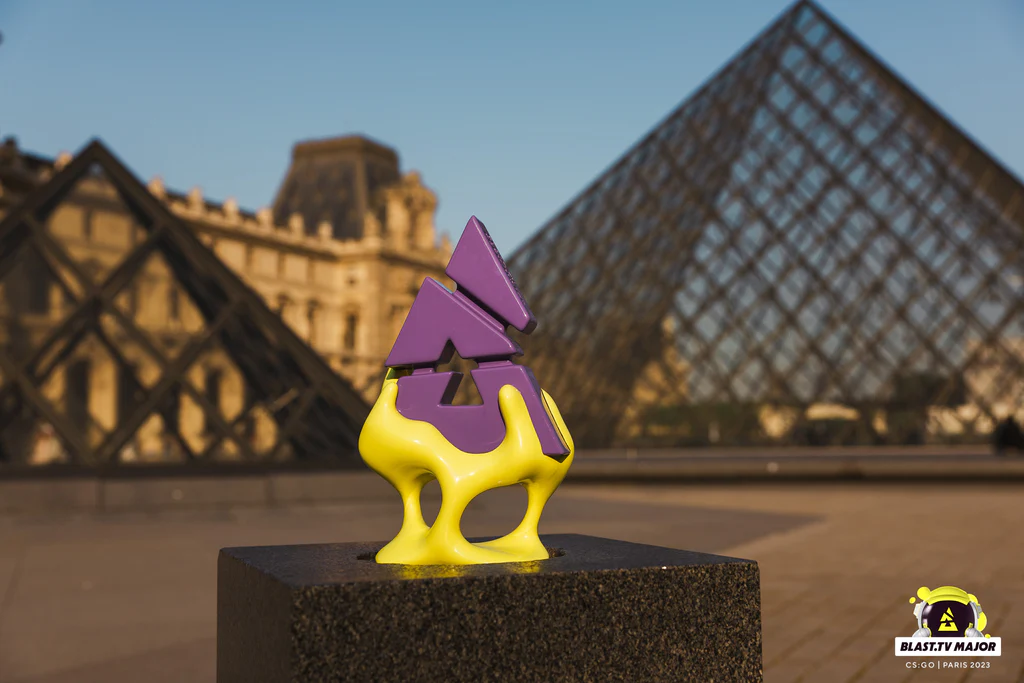
Tetris
The T-shaped tetris block is probably the most iconic gaming-related design in history. So,the decision to use this shape for Tetris World Championship’s trophies was probably the easiest one for the organisers to make. The World Championship used several different blocks throughout the years, but the metal T-shape (in silver or gold, depending on the year and placement) is something even those with no knowledge of gaming will instantly recognise.

Brawl Stars World Final
Changing the scene from PC games to mobile games, the trophy for the Brawl Stars World Final is certainly unique enough to be featured on this list. For one, the trophy is very large and finished in bright yellow, resembling the game’s logo — which is also a trophy.
The trophy’s large size and cartoonish appearance goes well with the Brawl Stars theme, considering that the game takes place in a theme park, features similar characters, and a healthy dose of humour. The trophy itself has not changed for the last couple of years, but its base changes colour and design to make each edition stand out from the previous ones.
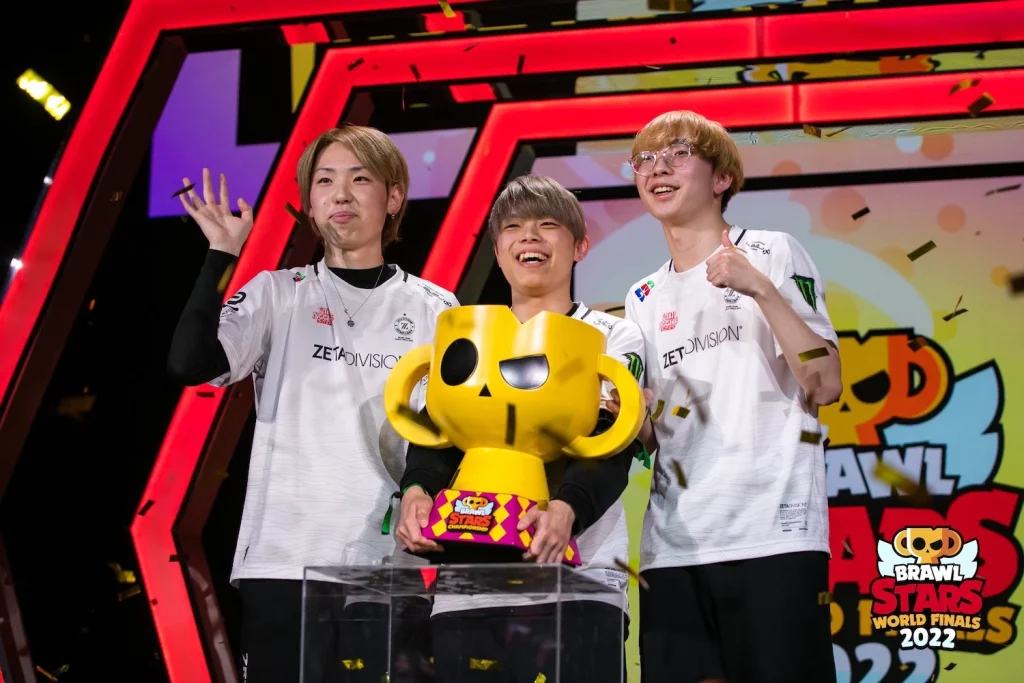
Flashpoint
The AK-47, also known as the Kalashnikov rifle, is one of the most iconic weapons ever. Although it is present in almost every FPS game, the AK is cherished and loved the most by the Counter-Strike community. The T-side exclusive weapon is so connected to CS:GO that Flashpoint, a CS:GO league which is sadly not around anymore, used it as its trophy.
The real-life-sized AK was the trophy for the league throughout its duration, seeing several finishes depending on the year, ranging from colourful to metallic. The AK looks identical to the real-world one, and is placed on a stand reminiscent of a stone with large FLASH POINT letters below the rifle.
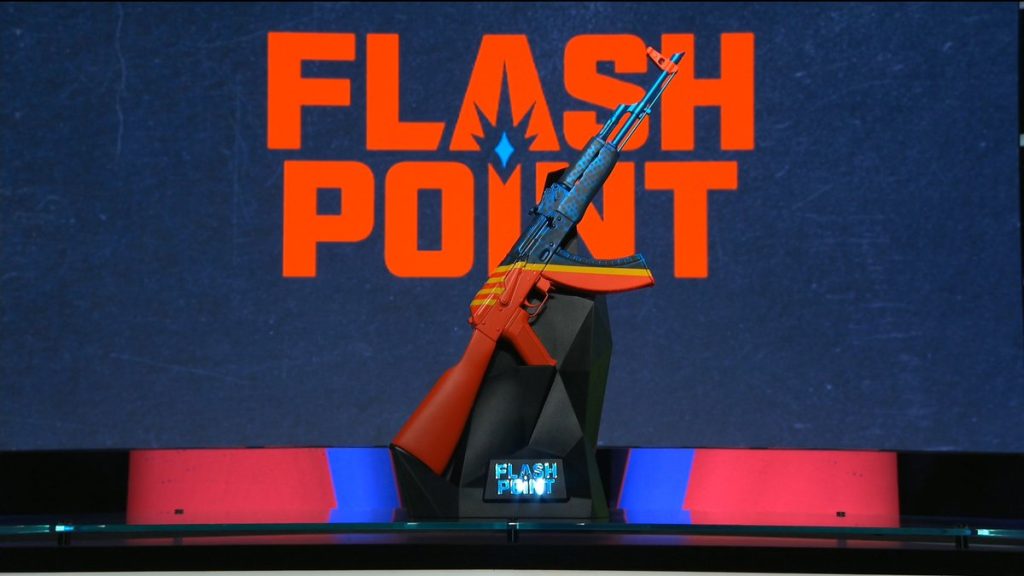
Tekken World Tour
Tekken is one of the best-selling game franchises of all time, and one that has a steady presence in the world of esports. Although it might not have the esports appeal that some of its competitors, such as Street Fighter, have, Tekken is still a very popular competitive game.
The 2019 edition of the Tekken World Tour presented the world with a very unique and interesting trophy. Two gold fists are featured on a large triangular stand, making the overall trophy a very large item to be held by just one person. The design goes well with the overall idea of the King of Iron Fist Tournament, a fictional martial arts tournament taking place in the Tekken universe.
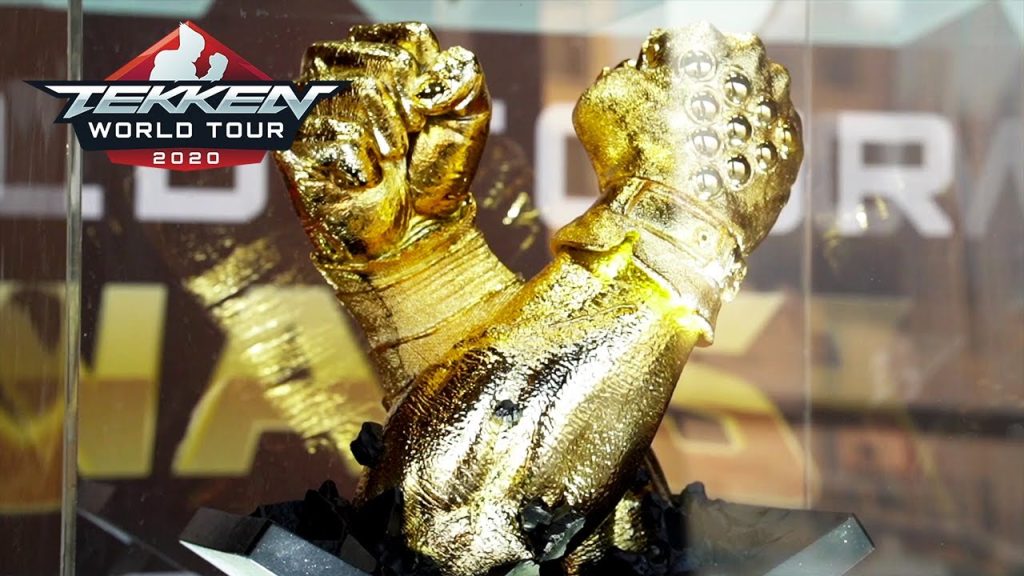
FNCS trophy
The FNCS is the top-tier esports competition in Fortnite, Epic Games’ battle royale game. The game itself is one of the most popular in the world, but its esports scene has shrunk significantly since the chart-topping Fortnite World Cup which took place before the pandemic. Still, the FNCS is now steadily growing in popularity, and its trophy is there to reflect it.
Designed by the world-famous crystal manufacturer Swarovski, the FNCS trophy is a statement piece that looks like a high-end art piece more than an esports trophy. Swarovski lent its expertise to create its first-ever esports trophy. The actual trophy resembles the FNCS logo and was first created for the 2022 edition of the event. Interestingly, Swarovski and Epic Games worked together again in 2023 to create the second edition of the trophy, this time around choosing gold instead of silver for its main colour.
